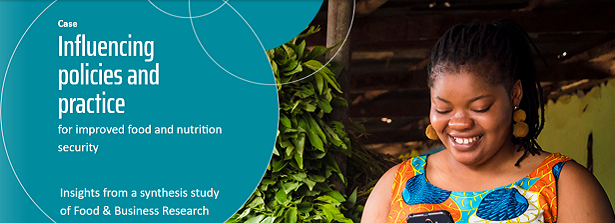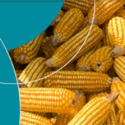Influencing policies and practice for improved food and nutrition security

Inclusive and multifaceted policies and practices are needed to achieve Food and Nutrition Security (FNS) for all. The design of food security policies can be influenced by knowledge and research. A better understanding derived from research, can help policymakers and practitioners reconsider or adjust their policy priorities, strategies and viewpoints. Policy decisions influence the incentives and actions of farmers, the agricultural and food industry, and consumer groups – and thus enhance the potential for achieving nutrition and food security goals.
This is the second outcomes paper “Influencing policies and practice for improved food and nutrition security – Research outcomes for policy formulation and implementation” of a larger series of publications commissioned by NWO-WOTRO, together forming a synthesis study of the Global Challenges Programme (GCP) and Applied Research Fund (ARF) projects under the Food & Business Research programme, executed by Daniëlle de Winter and Ellen Lammers.
The full paper assesses the outcomes delivered by sixteen Food & Business Research (F&BR) projects for both policy formulation and implementation of FNS policies by government and non-profit agencies.
Influencing policy formulation
Projects contributed to a better enabling policy environment with outcomes in three policy areas: (1) promoting alternatives for declining natural resources (e.g. water scarcity, soil depletion, over-fishing); (2) responding to growing and changing food demands due to growing and/or more affluent urban populations; (3) improving smallholder livelihoods. Examples of successful policy influencing that the projects contributed to include the development of a roadmap and legal framework for the production of insect-based animal feed in Kenya; a revision of the national seed law in Burundi that enables smallholders to participate in seed multiplication; revitalised discussions about implementation decrees in the fisheries sector in Benin; and the formulation of a county-level food safety policy in Kenya. A strong alignment with local or national government policy objectives as well as co-creation processes with policymakers were important drivers for these achievements.
Supporting policy implementation
On the policy implementation side, the reviewed projects showed how research that is based on co-creation can:
- act as catalyst for FNS policy implementation;
- support policymakers and practitioners in their role as facilitator of agricultural training, support and extension services;
- support standardisation and certification processes of innovative agri-products and techniques.
Several projects delivered outcomes in terms of improving the quality and expanding the reach of advisory and extension services. As smallholders have very limited access to accurate sources of information, it is essential that the information that does reach them is contextualised, validated and applicable to their needs. Projects focused on this by translating research findings into (advice on) targeted training programmes and other support mechanisms.
Strong alignment with government policy objectives and co-creation with policymakers
With strong commitment and respective investments by government, non-profit and private sector stakeholders, the projects addressed obstacles to effective policy implementation. In Burundi, project insights were instrumental in getting support from the Embassy of the Netherlands for establishing a national soil testing laboratory. This laboratory promotes targeted fertiliser use for different agro-ecological zones in the country, thus increasing smallholder yields. Other research projects worked closely with National Standard Organisations to achieve certification for the innovative product and technology solutions that were developed. These ranged from improved seed varieties and fertilisers made from organic urban waste to traditional fermented foods and infant foods made of local food resources.
Lessons learned and ways forward
To strengthen FNS policy formulation and implementation, the synthesis study showed the importance of:
- Acknowledging the two-way street of research and policy for contextualised and research-based policy formulation.
- Partnering up to reveal possible missing ‘implementation nodes’ along the policy implementation chain.
- Ensuring that research findings are translated and contextualised to reach and be relevant for local implementors working with farmers and producers at local and national level (e.g. advisory and extension services and local training and support institutes).
- Treading cautiously when setting standards and quality expectations for small-scale agricultural producers in the Global South.
Downloads
- Download the full paper “Influencing policies and practice for improved food and nutrition security – Research outcomes for policy formulation and implementation”
Authors: Daniëlle de Winter and Dr Ellen Lammers.






